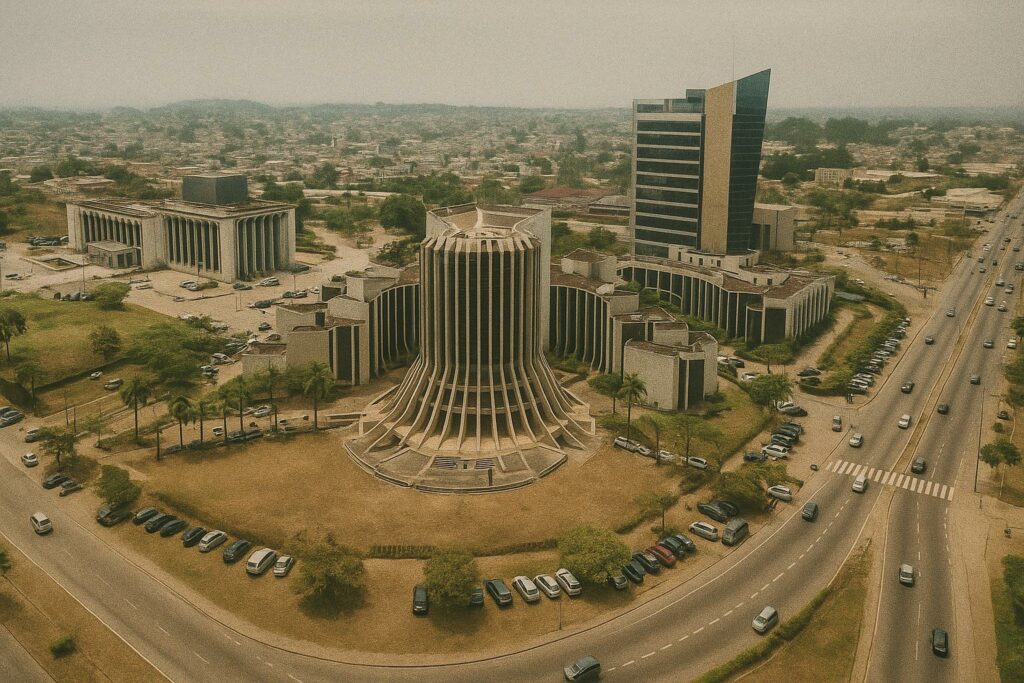World Bank Diagnosis Points to a Delicate Recovery
Released on 26 June, the World Bank’s 2025 Economic Update offers a cautiously upbeat narrative: Gabon’s real GDP expanded by 2.9 % in 2024, reversing the anaemic 1.5 % recorded a year earlier (World Bank 2025). The rebound, the report notes, stems chiefly from a 4 % uptick in crude output after unplanned maintenance in 2023 and the resumption of stalled public-works contracts financed under the Plan d’Accélération de la Transformation. Yet Bank economists are swift to stress that per-capita income continues to retreat in real terms, given population growth of roughly 2.4 % and consumer inflation flirting with 5 %.
IMF staff, who concluded their Article IV consultation in May, strike a similar tone, projecting medium-term growth around 3 % should reform momentum persist (IMF 2024). By regional standards those numbers appear respectable—Central Africa’s average is just 2 %—but they remain insufficient to reverse a poverty rate that has edged above 35 %, up three percentage points since 2020.
Oil Dependence Remains a Double-Edged Sword
Hydrocarbons still account for 70 % of export receipts and nearly one-third of government revenue, leaving the economy hostage to price gyrations. Brent averaged 83 USD a barrel in 2024, padding the treasury but also amplifying the ‘oil illusion’ that postpones diversification. The drilling of the Simba and Ivinga offshore blocs by BW Energy promises incremental barrels in 2025, yet mature onshore fields continue their inexorable decline, a trend S&P Global now pegs at 5 % per annum (S&P 2024).
Attempts to develop value-added timber processing and manganese beneficiation have yielded mixed results. While the Nkok Special Economic Zone has attracted 140 enterprises, manufacturing’s share of GDP still hovers below 6 %. The African Development Bank warns that without reliable power and an upgraded port at Owendo, non-oil exports will struggle to breach the psychological 1 billion-dollar mark (AfDB 2024).
The Fiscal Picture: Reforms under Strain
Buoyant oil royalties helped narrow the overall fiscal deficit to 1.9 % of GDP in 2024, yet the underlying non-oil deficit widened to 9 %, testimony to spending pressures ahead of the 2025 legislative elections. Civil-service wages still absorb 42 % of current expenditure despite a nominal hiring freeze, and arrears to domestic suppliers reached 2 % of GDP by December, according to the finance ministry’s own dashboard.
Debt dynamics remain worrisome. Public debt fell marginally to 61 % of GDP, but the stock is increasingly skewed toward commercial paper with shorter maturities. A 500 million-dollar Eurobond maturing in 2027 will need refinancing at a time when Gabon’s sovereign spread over U.S. Treasuries sits above 800 basis points. Fitch Ratings consequently revised the outlook to ‘negative’ in March, citing ‘persistently weak non-oil revenue mobilisation’ (Fitch 2024).
Socio-Economic Indicators Signal Uneven Gains
The modest headline growth masks uneven welfare outcomes. The unemployment rate stabilised at 19 %, yet youth unemployment remains stubbornly above 35 %, fueling urban discontent in Libreville and Port-Gentil. A nationwide teachers’ strike in April exposed the fragility of the social contract, with unions decrying classroom sizes exceeding 70 pupils and a chronic shortage of textbooks.
Health metrics tell a similar story of under-delivery. While Gabon maintains the region’s highest health spending per capita, maternal mortality has plateaued around 200 per 100 000 live births, well above the government’s Vision 2025 target of 125. The World Health Organization attributes the gap to rural-urban disparities and supply-chain disruptions affecting essential medicines (WHO 2024).
Regional Dynamics and External Shocks Complicate Forecasts
CEMAC’s recent decision to keep the CFA franc pegged to the euro at 655.957 adds monetary stability but also transmits European disinflation, eroding Gabonese export competitiveness. Meanwhile, heightened piracy incidents in the Gulf of Guinea have inflated marine insurance premiums by 15 %, nibbling at profit margins for timber shippers.
Climate-related shocks constitute an emerging variable. Intense rainfall in November paralysed the Trans-Gabon Railway for ten days, delaying manganese deliveries to Owendo and knocking 0.1 percentage point off quarterly GDP. The Ministry of Economy has floated a 300 million-dollar climate-resilience bond, but investors await clarity on the legal framework before committing funds.
Policy Options and Diplomatic Leverage Ahead
The government’s immediate challenge is to pass the delayed fiscal-responsibility bill, which would cap current expenditure at 20 % of non-oil GDP. Diplomats from Paris and Beijing, Gabon’s two largest bilateral creditors, privately concede that passage of the bill would unlock concessional funding for the Libreville-Franceville highway, a project stalled since 2021.
Longer term, the World Bank advocates an overhaul of the investment code to reduce discretionary tax exemptions that currently cost the exchequer up to 4 % of GDP. Energy diversification, notably the 120-megawatt hydro scheme on the Ngounié River, could lower electricity tariffs and lure agro-processing investors. As one senior official quipped, ‘We have to learn to treat oil as a bridge, not a destination’. Whether that lesson translates into actionable policy before the next downturn is the question keeping analysts—and voters—uneasy.

